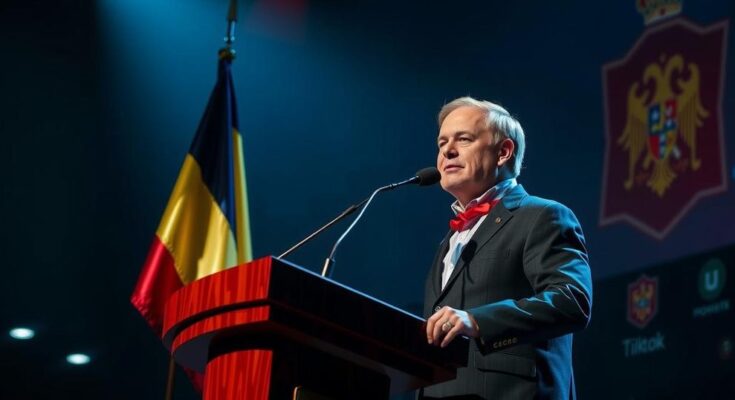The first round of Romania’s presidential election resulted in an unexpected win for independent candidate Calin Georgescu, largely attributed to his viral success on TikTok. His polarizing videos attracted significant youth support, raising concerns about the platform’s influence and potential regulatory failures. TikTok denied allegations of preferential treatment, even as experts criticized its algorithm for amplifying extreme views. The outcome emphasizes the need for scrutiny regarding social media’s role in political campaigns.
The surprising outcome of the first round of Romania’s presidential election saw independent candidate Calin Georgescu emerge victorious, despite his relative obscurity in traditional political circles. His success has been attributed significantly to his viral presence on TikTok, where he garnered over 520,000 followers and millions of likes. Georgescu’s campaign has attracted attention due to its polarizing content, which includes controversial statements regarding political figures and admiration for Russian President Vladimir Putin, leading to accusations that TikTok provided him with an unfair advantage.
Social media, particularly TikTok, has been pivotal in reaching the youth demographic, with roughly nine million Romanians utilizing the platform. Over one-third of votes from individuals aged 18 to 24 favored Georgescu, indicating the profound impact of digital engagement in shaping electoral outcomes. Furthermore, Romania’s electoral oversight body has called for an investigation into TikTok’s practices, alleging that the platform did not adhere to regulations requiring clear identification of presidential candidates and disclosure of their financial sources.
In response, TikTok denied any wrongdoing, asserting that they have removed numerous fake accounts and disputing any claims of interference. Critics have expressed skepticism about TikTok’s defense, suggesting that the presence of such accounts contradicts the company’s claims of integrity. Observing this phenomenon, experts have highlighted the algorithmic dynamics of TikTok, which often amplify extreme viewpoints that generate engagement, thereby normalizing contentious narratives. They stress that the migration of trends from TikTok to other platforms may affect broader societal perceptions and political discourse.
The role of social media in political campaigns has become increasingly significant in recent years, transforming how candidates engage with the electorate. Specifically, TikTok has emerged as a formidable platform for youthful political engagement, allowing candidates to disseminate their messages rapidly and authentically. The ability of these platforms to shape public opinion is particularly evident in the context of the Romanian presidential election, wherein a previously unknown candidate could leverage digital strategies to achieve unexpected electoral success. Given the global rise of misinformation and the influence of algorithms, challenges arise concerning political transparency and the ethical responsibilities of social media platforms in regulating content.
The 2024 presidential election in Romania illustrates the profound effect social media, and specifically TikTok, can have on political outcomes. As Calin Georgescu rises to prominence through an unconventional digital campaign, questions surrounding electoral integrity and platform accountability are thrust into the spotlight. Observers argue for increased scrutiny of social media’s role in democratic processes, emphasizing that future electoral strategies must consider the pervasive influence of digital engagement and its implications for political discourse.
Original Source: www.dw.com




